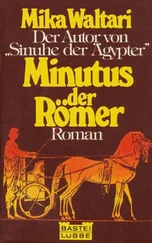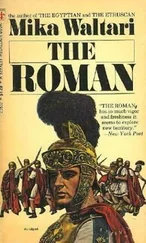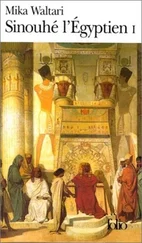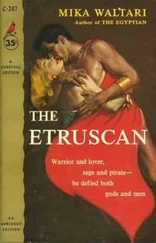When after two and a half years’ absence Abu el-Kasim returned from Bagdad his house was so full of yelling, squabbling servants that he did not recognize it, and had to go out into the street again to make sure he had come to the right place. And truth to tell I had long forgotten that I was a mere guest in his house and was making use of what belonged to him. But the deaf-mute, half starved, ragged, verminous, and long since banished to the obscurest corner of the yard where he dragged out a miserable existence beneath a roof of woven withies, at once recognized his lord. He squealed and scampered about and fawned upon him, like a faithful dog welcoming his returning master.
At first I hardly knew Abu. He wore a large turban and a kaftan with jeweled buttons, and on his feet were slippers of red leather. With a gesture of command he bade his three donkey drivers unload the bales of merchandise from the backs of their beasts. The donkeys were gray, sturdy creatures; silver bells jingled on their harnesses and from the great bundles they carried floated a fragrance of musk and spice. Abu el-Kasim himself smelled of musk and rose water and had even pomaded his sparse beard. It was clear that he had prospered on his travels.
Before I hurried out to greet him I glanced about me and to my shame observed the hideous confusion prevailing in his house. His cooking pots were dented, his pitchers chipped, and his costly rugs worn threadbare. Baby clothes hung out to dry in the yard, the two Negroes lay snoring on the porch, and in the midst of all sat the Russian woman with knees apart and eyes half shut, suckling my daughter and her son. The scales fell from my eyes at last and I perceived how neglectful Giulia had been of Abu el-Kasim’s house. She was not even at home now, but had gone to the Seraglio or the bathhouse, “to attend to her work,” as she would say whenever I questioned her.
My fingers were ink stained. I had slept badly and was worn out with trouble and anxiety, but despite my weariness and shame a wave of warmth swept through my heart as I embraced Abu el-Kasim and with tears of joy welcomed him home after the hardships of his perilous journey, from which I had feared he would never return. Abu looked about him with his monkey eyes and was on the point of tearing his beard, but recollected himself in time and said bitterly, “I can see for myself that my return was unexpected. But I’ll endeavor to control my tongue if you will at once fetch me a little water that I may perform the lesser ablution and repeat the prayer of homecom- ing.”
While he was engaged in his devotions I contrived by savage imprecations and blows to restore a measure of order. The slaves cleared part of the house by throwing out our own belongings and helping the donkey drivers to carry in the bales. Having ordered the cook to prepare a meal instantly, I accompanied Abu el-Kasim ceremoniously into the house and led him toward the place of honor. But Abu paused before the Russian woman, who had never learned to veil her face in the presence of men, and gazing enchanted at her and the two children at her breast he said, “I see that you have taken another wife, Michael el-Hakim, and evidently not a moment too soon, since Allah has already blessed your household. Never have I beheld a finer boy. He is fairer than the moon and the image of his father.”
He took the child in his arms and wept with delight when the boy clutched his beard with his little fingers. The Russian was delighted at this condescension; she modestly covered her bosom and even drew a veil over her round face as she gazed moist eyed at Abu el-Kasim. I snapped, “She’s no wife but a bought slave. It is my daughter who is fairer than the moon and out of regard for the Sultan I have whispered the name Mirmah in her ear, after the Moslem manner, since the Sultan’s own daughter has been given that name. But I forgive you, Abu el-Kasim, for no doubt you have not yet rubbed the dust of travel from your eyes.”
He handed the boy back reluctantly to the mother, stroked my daughter’s cheek out of politeness, and seated himself in the place of honor. A scullion, trembling with fear, brought sherbet in a silver goblet and spilled some of the sticky liquid over Abu’s knees. Abu fished a dead fly from the cup, tasted the drink, and said with a grimace, “What delicious sherbet! Its only defect is that it’s too warm-but then it’s so much the sourer. However, for the sake of your child I forgive you everything, Michael el-Hakim, though I confess my first impulse was to send for the cadi and two competent witnesses to assess the damage you have done to my beautiful house. But for thirty years no little hand has tugged at my beard. I will not be petty. I can afford to look the other way, and indeed have always been magnanimous.”
To cheer him I explained that my new house would soon be ready, and even promised to have certain repairs carried out in his own. When we had eaten a good meal together and opened a jar of wine all awkwardness between us melted away; our conversation grew ever more animated and Abu el-Kasim told me of the marvels of Bagdad that not even Genghis or Tamerlane had been able to destroy. He spoke too of the Persian rose gardens, of Tabriz and of Ispahan, and praised in glowing terms that long-hallowed land of poets. As to his own affairs, however, Abu was reticent, and he was unwilling to open his bundles, though it was not long before the whole house was fragrant with them. The smell of musk wafted out into the street, bringing the neighbors to our gate to shower blessings on Abu el-Kasim at his most happy homecoming. Moved to tears he distributed the remainder of our meal among them-more indeed than I had intended to give away-and sobbed with the nostalgia born of wine, “Ah, Michael! My name is Abu el-Kasim, but you have never even asked me why I so call myself and what became of my son Kasim. Today I felt a child’s hand playing with my beard for the first time in many years; time rolled backward, the fount of tears was unsealed, and I looked for a moment into the well of my own life. Woe, woe is me! So dearly did I love my only son that at his birth I tempted Allah by changing my name to Kasim’s Father, Abu el-Kasim.”
He plunged again into sorrowful memory. Presently he looked up and said in an altered tone, “That reminds me that on my journey I met our friend Mustafa ben-Nakir. At the moment he is studying poetry under the guidance of the most eminent poets of Persia. He’s also associating with dissatisfied dignitaries who resent the tyranny of young Shah Tahmasp and want to abandon the Shiite heresy while there is yet time, to return to Sunna, the true path.”
Only now did I understand in my innocence that Abu el-Kasim and Mustafa ben-Nakir had gone to Bagdad and Persia to gain knowledge that would be of use in the event of war in the East. Much disturbed I exclaimed, “Allah! You cannot mean that the Grand Vizier is secretly spreading dissension in the Persian dominions? The Sultan has given firm assurance of his desire for peace, and he needs all his forces to defend Islam against the Emperor’s planned attack.”
Abu el-Kasim replied, “Unfortunately Mustafa ben-Nakir has obtained incontrovertible proof that Shah Tahmasp, to Islam’s shame, has begun negotiations with the Emperor and asked his help in a war against the Sultan. The time is indeed ripe for all Mussulmans to lift up their voices and cry across the world, ‘To our aid, all true believers!’“
At his words I seemed to hear the roar of an avalanche and I choked over my wine. For if the Sultan were forced to wage a double war and defend himself against both Emperor and Shah, then indeed evil days were dawning for us all. Abu el-Kasim blinked at me and went on, “In their blindness these infernal Shiites would rather fight on the side of the unbelievers than submit to Sunna and the rule of uncultured Turks. Much indignation has also been aroused by the rumor that the Grand Mufti has issued a fatwa by which in any future war the Shiites may be deprived of their property and sold into slavery, though they themselves are Moslems.”
Читать дальше











